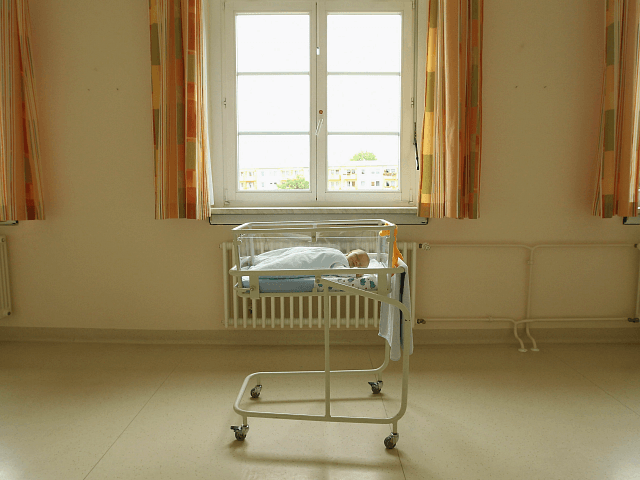Total births in the European Union’s 28 member states in 2017 has fallen from the year before, while first-time mothers are now almost 30.
Figures released by Eurostat on Tuesday revealed that there were 5.075 million babies born in the union in 2017, compared with 5.148 million in 2016 with the total fertility rate standing at 1.59 births per woman — down from 1.60 on the year before and well below the 2.1 births per woman needed to maintain a population.
In terms of individual countries, France had the highest fertility rate at 1.90 births per woman, followed by Sweden (1.78), Ireland (1.77), Denmark (1.75), and the United Kingdom (1.74).
The lowest fertility rates were in Malta (1.26), Spain (1.31), Italy and Cyprus (both 1.32), Greece (1.35), Portugal (1.38), and Luxembourg (1.39).
These figures reveal that not one of the 28 European Union countries came close to replacement level in 2017.
Of the five million plus births that year, 45 per cent where for a first child, while just over one third (36 per cent) were a second child, while fewer than one-in-five (19 per cent) were of a third or subsequent child.
The average age of first-time mothers is also getting slightly older, at 29.1 compared to 29 years old in 2016.
‘We Need Hungarian Children’: Orbán Introduces Tax Breaks for Families https://t.co/sEGCeoujZ8
— Breitbart London (@BreitbartLondon) February 11, 2019
Countries where the mean age for a first-time mother is less than 27 tend to be concentrated in eastern Europe, including Latvia, Bulgaria, Romania, while the oldest first-time mothers tend to be concentrated in the south (Italy, Spain, and Greece), and Luxembourg, and the Republic of Ireland.
Proponents of mass migration have argued that the so-called ‘demographic timebomb’ of Europe can only be solved with importing peoples from the Global South, with that solution being grasped with both hands by Western and Northern European countries like Sweden and Germany, where mass migration alone now accounts for population growth.
The belief that opening the borders to mostly unskilled migrants will answer the question of where a new workforce will come from to pay the social security of the older generation has been condemned as a Ponzi Scheme, as migrants themselves will grow old and need social care, and evidence showing that the vast majority of migrants arriving in some countries are still unemployed.
There is also the initial financial costs for care and integration of new arrivals to consider, as well as the social costs of rising terrorism and crime.
Germany: No ‘Economic Miracle’ as 65 Percent of Refugees Still Jobless https://t.co/Jo4MRY9IHL
— Breitbart London (@BreitbartLondon) January 31, 2019
Eastern and Southern Europe have moved towards a different approach in recent years, however, approving government policies that support Europeans to grow their own families.
Last month, conservative prime minister of Hungary Viktor Orbán introduced several family-friendly government initiatives to boost natural population growth in his country, including a loan of ten million Forints (£27,385/$35,230) to every woman under 40 who marries for the first time, with the loan completely written off after the birth of her third child, and women who have raised four or more children being exempt from paying income tax for life.
Similar measures were introduced in Poland in January, when the parliament approved a special pension for mothers and grandmothers who have raised four or more children as a means of showing, what Prime Minister Mateusz Morawiecki called, “gratitude and respect” to women who have “devoted their lives to bringing up children.”
When announcing the proposals in February, Prime Minister Orbán stated that his country would choose family over mass migration, saying, “In our minds, immigration means surrender… If we resign ourselves to the fact that we are unable to sustain ourselves even biologically, by doing so we admit that we are not important even for ourselves.”
Italy’s populist Deputy Prime Minister and Interior Minister Matteo Salvini, who launched a Ministry of Family and whose League party floated the idea of giving land to families expecting their third child, shared a similar sentiment last year when he said, “A country which does not create children is destined to die.”
Italy’s Salvini Wants More Babies, Fewer Migrants: ‘A Country Which Does Not Create Children is Destined to Die’ https://t.co/JDjWgcTsUB
— Breitbart London (@BreitbartLondon) July 29, 2018

COMMENTS
Please let us know if you're having issues with commenting.